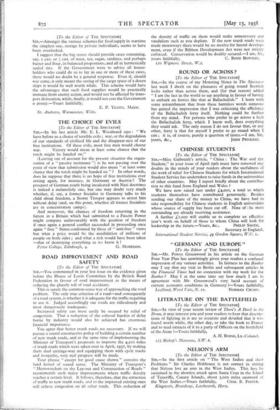ROAD IMPROVEMENT AND ROAD SAFETY
[To the Editor of THE SPECTATOR]
SIR,—You commented in your last issue on the evidence given before the House of Lords Committee by the British Road Federation in favour of road improvement as the means of reducing the ghastly toll of road accidents.
This is surely the common-sense way of approaching the road problem. The only true criterion of a road—and consequently of a road system, is whether it is adequate for the traffic requiring to use it. Judged accordingly our roads are ridiculously and most dangerously inadequate.
Increased safety can most easily be secured by relief of congestion. That a reduction of the colossal burden of delay borne by industry would also be achieved has enormous financial importance.
You agree that better trunk roads are necessary. If we will pursue a sound constructive policy of building a certain number of new trunk roads, and at the same time of implementing the Minister of Transport's proposals to improve the 4,500 miles of trunk roads which were taken over in April, 1937, by making them dual carriage-way and equipping them with cycle tracks and footpaths, very real progress will be made.
Your phrase " except for good cause shown " contains the hard kernel of sound sense. The Ministry of Transport's " Memorandum on the Lay-out and Construction of Roads " recommends such major improvements where traffic density reaches a certain level. It follows, therefore, that the attraction of traffic to new trunk roads, and to the improved existing ones will relieve congestion on all other roads. This reduction of
the density of traffic on them would make unnecessary any vandalism such as you deplore. If the new trunk roads were made motorways there would be no motive for lateral develop- ment, even if the Ribbon Development Act were not strictly enforced. Conservation would be doubly secured.—I am, Sir,














































 Previous page
Previous page